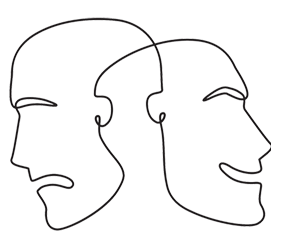Mindfulness Practice
You are not your thoughts, and your thoughts are not you.

overview
Quiet your mind with SOAP
Separation from Thoughts
How easily do we become entangled and trapped in our own thoughts? One thought leads to another, then another. Soon, we are immersed in a full-blown dramatic narrative about something that seems to exist only in our minds. Certain ideas, particularly unpleasant, judgemental, or hurtful ones, are notoriously difficult to separate from.
With mindfulness, we take a step back and see our thoughts for what they are: just thoughts. You might remark, "Thank you, mind, for that thought" if you find your mind always generating stories or solving problems. Observing one's thoughts for a sufficient amount of time reveals that the majority of thoughts contain little truth and are frequently detrimental.
Observing Yourself
So frequently, we establish our identities based on our thoughts, emotions, and bodies. We believe that our anger, despair, and anxiety define us. We can be convinced that the thought "I am a bad person" accurately describes us. Or that our bodies define us as individuals.
With mindfulness, we are able to acquire perspective on the situation. We enter a realm in which we simply observe ourselves. We can simply observe our thoughts, emotions, and bodily experiences without associating with them. Imagine merely watching the ocean's waves come and go.
Accepting one's emotions
Have you ever question why you continue to experience a certain emotion? Typically, this occurs because resisting it gives it more vitality. According to Carl Jung, "what you resist persists."
Acceptance entails relinquishing this battle and allowing your emotions to exist as they are. That means allowing them to unfold spontaneously within you. Acceptance is a daring act of self-love, in my opinion. You are saying to your emotions, "I recognize and accept you just as you are."
Present Moment
Frequently, our minds wander into the past or future, making it difficult to remain in the present. It is the nature of the mind. They predict the future and worry over the past to ensure that we have learnt how to avoid future suffering.
Mindfulness involves refocusing our attention on the present moment. Focusing on our five senses is a simple technique to accomplish this goal. What do you perceive? See? Taste? Touch? Smell? The five senses bring us back to the present. Similarly, focusing on your breathing accomplishes this. Our body can be a useful anchor for returning to the present.
Mindfulness may seem like a hard concept to understand, but it's actually pretty easy to do because it's something we all have access to and do at some point in our lives.
Some athletes call it being "in the zone." A very mindful moment is when you are present, accepting, open, and not stuck in your thoughts.
To put it all together, here's a quick example: You get angry when a car cuts you off in traffic. "That guy is a jerk," you say.
Your body and mind might just take over with anger, and you might slam on the brakes and yell at the guy. You could also feel yourself getting angry and try to convince yourself that you shouldn't be angry because only crazy people get angry and it's dumb to get angry.
With mindfulness, you might notice the anger in your body and let it come up. You might see your angry thoughts as just thoughts and let them come and go. You might just watch all of this happen inside of you and choose to come back to the present moment of your breathing.
Remember that being mindful is a practice, and the more you do it, the better you get at it.
Try different things to practice and see what works best. Walking, being in nature, working out, meditating, talking with a friend, eating something you love, and doing yoga are all good ways to relax. Here are some things to think about. Pick a way to be mindful that works for you.
Let's Talk
You will receive a 15 minute phone call from our group leader, as an introduction to the program and to discuss suitability. This is free and without obligation.


















